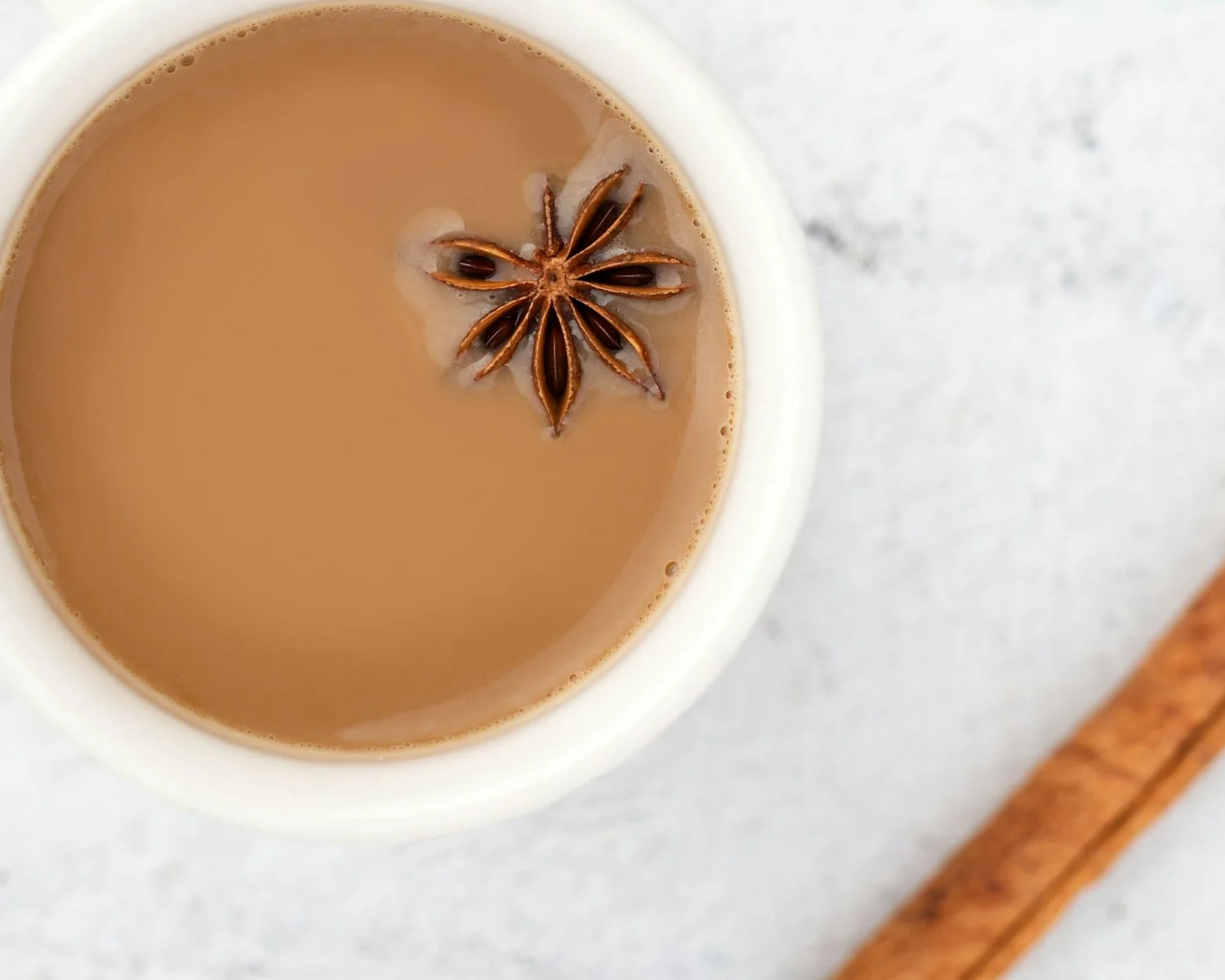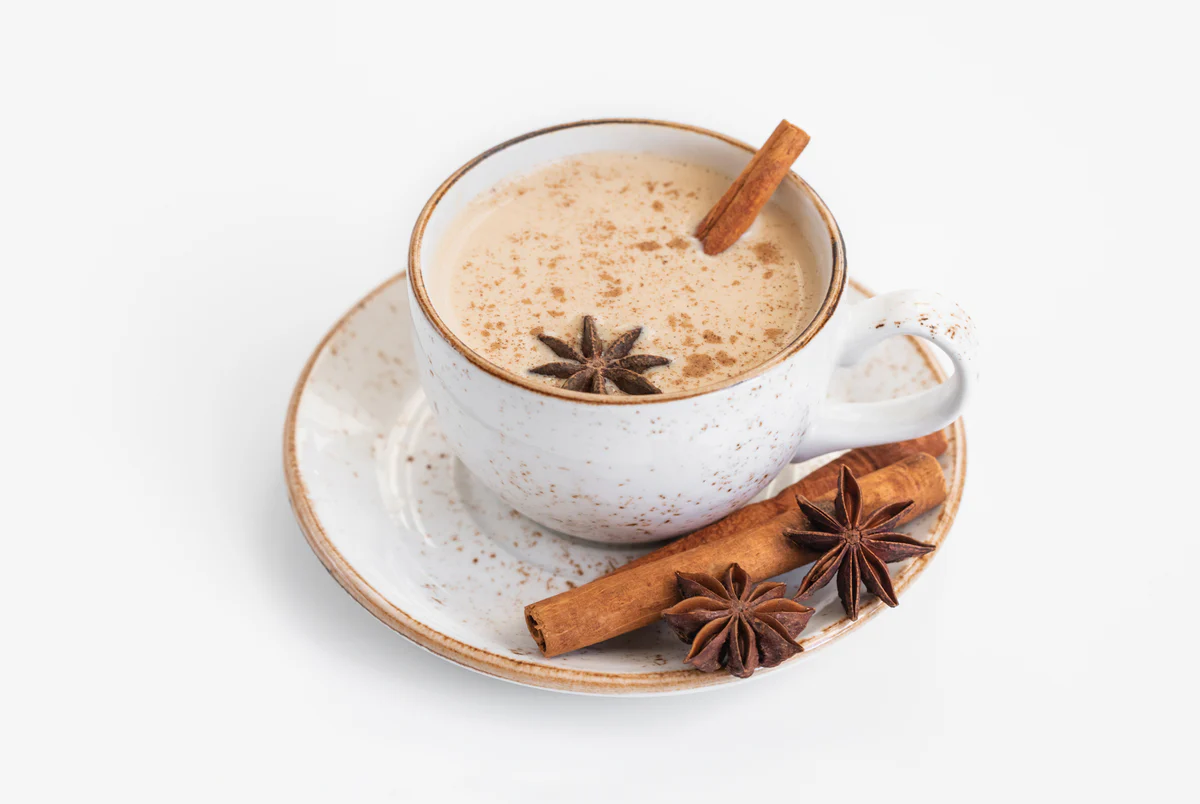Yes, traditional chai made with tea leaves contains caffeine. However, the amount varies widely depending on the base, brew method, and serving size. Herbal or rooibos-based “chai” blends are essentially caffeine-free.
“Does Chai Have Caffeine” This article explores what chai really is, how much caffeine it typically contains, what factors influence that amount, comparisons with other beverages, and strategies to manage intake. It also includes a detailed FAQ, tables, and lists to cover all angles.

What Is Chai? Definition & Types
Definition of Chai
Chai (from Hindi/Urdu “chai” meaning “tea”) refers to a spiced tea beverage. In the South Asian tradition, masala chai means a mixture of black tea leaves + aromatic spices (such as cardamom, cinnamon, ginger, cloves, pepper) brewed typically with milk and sweetener.
In many Western contexts, “chai” is short for “chai latte,” meaning a spiced tea concentrate served with steamed milk. Some blends shift base to green tea, white tea, or herbal (rooibos, honeybush) to offer different flavor or caffeine profiles.
Thus, “chai” is not monolithic; its caffeine depends heavily on its base tea and preparation.
Types of Chai (by Base)
-
Black tea chai – the classic version; always has caffeine
-
Green tea chai – milder caffeine than black
-
White / Oolong chai – intermediate levels depending on processing
-
Herbal / Rooibos chai – naturally caffeine-free
Because black tea (Camellia sinensis) typically contains 2–4% caffeine by dry weight, any chai using black tea will carry some caffeine.
Typical Caffeine Ranges in Chai
Due to the variety of recipes and brewing styles, caffeine in chai spans a broad range. Below is a table summarizing typical observed values.
| Chai Type / Context | Approx Caffeine (per ~8 oz / 240 mL) | Notes / Source |
|---|---|---|
| Black tea chai (loose/spiced) | ~25–60 mg | Many spiced tea vendors and estimates |
| Chai latte / concentrate versions | ~30–95 mg (varies) | Stronger concentrates push higher values |
| Green chai / lighter base | ~20–45 mg | Depending on leaf oxidation, blend |
| Herbal / rooibos “chai” | ~0 mg (negligible) | No caffeine in base tea |
| Tea bag style chai | ~40 mg | WebMD cites chai tea bag varieties ~40 mg |
| Standard strong chai | ~40-50 mg | JavaPresse test finds ~40–50 mg in standard cup |
Many sources converge around ~40 mg as a common mid-point, though deviations exist based on strength and serving size.
What Determines Does Chai Have Caffeine?
When you ask “does chai have caffeine?” the answer hinges on these critical influencing factors:
1. Base Tea & Tea Variety
-
Black teas typically have higher caffeine than green, white, or oolong.
-
Tea cultivar (Assam, Darjeeling, Ceylon) and leaf grade (broken leaf vs. whole leaf) matter.
-
Decaffeinated tea or herbal base yields negligible caffeine.
2. Tea-to-Spice Ratio & Blend Composition
-
Chai mixes tea and spices. The more spices relative to tea, the lower caffeine per volume (all else equal).
-
Some blends include non-tea herbs which dilute caffeine concentration.
3. Brew Time / Steeping Duration
Caffeine extraction is time-dependent.
-
Most caffeine is released in first 3 minutes, but additional extraction continues thereafter.
-
A 4.5-minute steep vs. 10-minute steep of green tea example: ~13 mg vs ~21 mg in one test scenario.
-
Longer steep = more caffeine (up to a point).
4. Water Temperature & Brewing Method
-
Hotter water improves caffeine extraction.
-
Boiling with milk (as in some masala recipes) can extract more than gentle steeping.
5. Concentrate vs Direct Infusion
-
Commercial chai concentrates or syrups are brewed strong, then diluted. Those initial concentrations carry more caffeine.
-
A chai latte from syrup may carry far more caffeine than simple brewed spiced tea.
6. Serving Size & Dilution
-
A 16-oz latte delivers more absolute caffeine than an 8-oz cup of the same concentration.
-
Heavy milk or water dilution lowers mg per mL, though total caffeine per serving may still be high.
7. Repeated Steeping & Reuse
-
Some chai recipes reuse tea leaves. Later steeps release much less caffeine.
-
Serial steeping reduces caffeine leakage.
Chai vs Coffee & Other Teas
Chai vs Coffee
Most coffees (drip, espresso) deliver ~95–120 mg caffeine per 8 oz.
-
JavaPresse test: standard chai ~40–50 mg vs typical coffee ~100 mg range.
-
WebMD: chai has less caffeine than coffee.
Conclusion: chai is a gentler stimulant than coffee in typical servings.
Chai vs Black / Green / Oolong / White Tea
Tea itself holds a range:
-
Black tea → ~47 mg average in an 8-oz cup per Wikipedia data.
-
Green, Oolong, White vary lower.
-
Chai often dilutes or blends tea with spices, so chai caffeine may lie at lower or intermediate positions.
Dirty Chai (Chai + Espresso)
“Dirty chai” means adding espresso to chai.
-
The espresso shot (~60–75 mg) pushes total caffeine significantly upward.
-
A dirty chai may surpass standard coffee’s caffeine or cross ~100–150 mg threshold.
Benefits & Risks of Caffeine in Chai
Benefits
-
Alertness & Mental Focus: Moderate caffeine helps block adenosine and improves wakefulness.
-
Antioxidants & Polyphenols: Tea tannins and chai spices (cinnamon, cardamom, ginger) deliver antioxidants and anti-inflammatory compounds.
-
Gentler Uptake: Tea’s caffeine binds to tannins, moderating absorption and reducing sharp spikes seen in coffee. Saratoga Tea notes tannin interactions slow release.
Risks & Considerations
-
Overstimulation: Excess caffeine may cause jitteriness, insomnia, palpitations.
-
Blood Pressure / Cardiovascular Stress: Some studies show caffeine can transiently raise blood pressure; effects vary.
-
Sleep Disruption: Late-day chai may impair sleep in sensitive individuals.
-
Medication Interactions: With SSRIs, stimulants, certain conditions.
-
Pregnancy / Lactation: Many guidelines recommend limiting caffeine ~200 mg/day in those states (less than general 400 mg limit).
Given these, moderate intake and attention to timing are wise.
Estimating Caffeine in Common Chai Scenarios
| Scenario | Estimated Caffeine | Key Assumptions |
|---|---|---|
| Homemade black tea chai (8 oz) | ~30–60 mg | Moderate brew, 4–6 min steep, moderate tea/spice ratio |
| Chai latte (12–16 oz) | ~40–95 mg | Using concentrated base + milk |
| Weak or lightly brewed chai | ~15–30 mg | Short steep, diluted ratio |
| Green tea chai (8 oz) | ~20–45 mg | Green tea base, moderate steep |
| Rooibos/herbal chai | ~0 mg | No caffeine in base tea |
| Dirty chai with single espresso | ~100–160 mg | Chai base + ~60–100 mg espresso shot |
This table offers rough guidance; actual values may differ by recipe and brand.
Ways to Reduce / Increase Caffeine in Chai
Ways to Reduce Caffeine in Your Chai:
-
Use a herbal or decaf base (rooibos, honeybush).
-
Brew for shorter time (2–4 min) instead of extended steep.
-
Use fewer tea leaves in proportion to spices.
-
Serve in smaller volume (e.g. 6–8 oz instead of 12–16 oz).
-
Add more milk or water to dilute concentration.
-
Use cooler water (not boiling), reducing extraction speed.
Ways to Increase / Maximize Caffeine in Your Chai:
-
Use strong black tea leaves (e.g. broken leaf / dust grades).
-
Steep for longer duration (8–10+ minutes).
-
Use hot water or boil with milk.
-
Use a concentrate / syrup method.
-
Serve in larger portions (12–16 oz or more).
-
Add a shot of espresso (“dirty” chai).
These lists help you tailor your chai’s caffeine strength.
FAQs
1. Can chai be completely caffeine-free?
Yes — if chai is made with a non-tea base such as rooibos or decaffeinated tea. These variants have negligible natural caffeine.
2. Is chai always stronger (in caffeine) than green tea?
Not necessarily. A weak black chai may have less or comparable caffeine to a strongly brewed green tea, depending on leaf amount and steep duration.
3. How does chai’s caffeine affect sleep compared to coffee?
Because tea caffeine binds with tannins and releases slower, chai’s stimulant effect tends to be gentler and less likely to spike you, but consuming it late can still impair sleep in caffeine-sensitive people.
4. Does adding milk reduce the caffeine in chai?
No — milk dilutes concentration but does not remove caffeine. The mg of caffeine stays the same if base brew volume is unchanged.
5. Does brewing chai with spices extract extra caffeine?
Spices themselves don’t contribute caffeine. However, boiling chai with spices may increase the effective temperature or prolong brew time, indirectly boosting caffeine extraction.
6. How many cups of chai can a person safely drink in a day?
For healthy adults, many experts suggest staying under ~400 mg of total caffeine per day. Thus you could consume ~5–10 moderate cups of chai, depending on strength. But individual sensitivity, health status, and other caffeine sources must be considered.
7. Does “chai latte” always mean there’s caffeine?
No — chai latte only describes a spiced tea beverage served with steamed milk. If the base is herbal or decaf, it can be caffeine-free.
8. Can I brew chai in advance and keep its caffeine stable?
Yes, but caffeine leaches over time and flavors change. A chilled or iced chai may lose aroma; long hold times may slightly reduce potency but caffeine mostly remains.
Learn More: How to Bake Lasagna: Time, Temperature, and Technique
What Is a Promise Ring: Complete Meaning, History, and Modern Significance
Conclusion
Yes, chai does have caffeine, but the amount depends entirely on how it’s made. Traditional masala chai brewed with black tea usually contains 25 to 60 mg per cup, while green chai holds slightly less, and rooibos or herbal chai contains none. Factors like steep time, water temperature, and tea-to-spice ratio directly shape its caffeine strength.
Unlike coffee, chai offers a balanced, smoother energy lift because of the L-theanine and tannins found in tea leaves, which help the body absorb caffeine slowly. This makes chai a preferred option for those who want focus without jitters.

